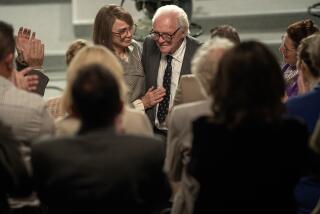‘Witman’ Reveals Cost of Absence of Love
- Share via
Janos Szasz’s “The Witman Boys,” which is Hungary’s official Oscar entry, is as impeccable as it is glum.
As a cautionary tale on the devastating effects of the absence of love in a society of the utmost severity, it is faultless in style and psychological validity. But its resolute lack of the leavening of dark humor or even irony has the effect of taking a very narrow view of life, and of reminding us that Szasz, as clearly talented as he is, really isn’t telling us anything about human nature that we didn’t already know.
It is set in a small city in the early months of 1914, a year that would alter the fate of Hungary forever. Minutes into the movie the prosperous Mr. Witman (Lajos Kovacs) drops dead of a heart attack, devastating his two sons, 14-year-old Janos (Alpar Fogarasi) and 12-year-old Erno (Szabolcs Gergely). The cold, handsome Mrs. Witman (Maia Morgenstern) clearly has never loved either her husband or her sons. She may be desperate for love herself, however, for she abruptly announces over dinner, soon after her husband’s death, that her guest (Peter Andorai) will from now on “be part of the family.” It is perhaps a measure of her desperation that she would throw away her reputation and disregard the social consequences to her sons of taking a lover under her own roof.
As it happens Janos is studying biology at the time of his father’s death, and classroom dissections inspire him and Erno, who have bonded closely, to take upon an especially morbid manner of exorcising their grief over their father’s death.
Just as the film threatens to become impossibly gloomy the boys discover sex in the form of an auburn-haired young beauty (Dominika Ostalowska), a prostitute of much tenderness and affection. But there comes the fateful day, perhaps inevitably, that she utters the timeless words to Janos that she would like “a present or some sweets the next time you come”--a request the boys take with a terrible seriousness that uncovers the full measure of their sense of alienation.
Certainly, “The Witman Boys” is beautifully acted, with the unsmiling Fogarasi and Gergely convincing us that they could stare down the devil himself. Certainly, too, it is elegant, and Tibor Mathe’s luminous cinematography has been honored at festivals, as has Szasz’s direction. But there’s not much of a reward to submitting to “The Witman Boys’ ” unremitting bleakness.
* Unrated. Times guidelines: descriptions of extreme cruelty to animals, violence, some nudity, some sex, profoundly adult themes.
(BEGIN TEXT OF INFOBOX / INFOGRAPHIC)
‘The Witman Boys’
Alpar Fogarasi: Janos Witman
Szabolcs Gergely: Erno Witman
Maia Morgenstern: Mrs. Witman
Dominika Ostalowska: Iren, the Prostitute
A Bunyik Entertainment release of a co-production of Budapest Filmstudio--Hungary (Ferenc Kardos), 47eme Parallele--France (Jean-Paul Dekiss), MTM Communications--Germany (Ferenc Tolvaly), Studio Filmowe Zebra--Poland (Jacek Moczydlowsky), Hungarian Television--(Eva Schulze), Mafilm RT--Hungary (Gyorgy Marosi). Writer-director Janos Szasz. Cinematographer Tibor Mathe. Editor Anna Korins. Costumes Agnes Jodal. Music Giuseppe Verdi, Franz Schubert, Johann Sebastian Bach. Production designer Jozsef Romvary. In Magyar, with English subtitles. Running time: 1 hour, 33 minutes.
* Exclusively at the Music Hall, 9036 Wilshire Blvd., Beverly Hills, (310) 274-6869.
More to Read
Only good movies
Get the Indie Focus newsletter, Mark Olsen's weekly guide to the world of cinema.
You may occasionally receive promotional content from the Los Angeles Times.










